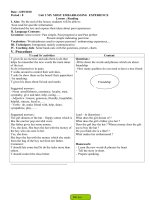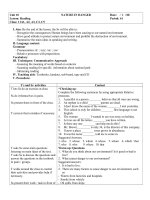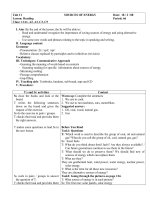giáo án tiếng anh lớp 11 Unit 16 language focus 0988 055 990
Bạn đang xem bản rút gọn của tài liệu. Xem và tải ngay bản đầy đủ của tài liệu tại đây (1.65 MB, 52 trang )
WARM-UP
•
Each sentence has a mistake. Find the
mistake by underlining it then give the
correct answer.
1. When I will see him tomorrow, I’ll give
him you address.
will see -> see
2. Do you know what he did after he has
eaten his breakfast?
has -> had
3. Can you help me while I was away?
was -> am
Lesson 5: Language Focus
I. Intonation: The rising-falling tune.
II. Grammar: Adverbial clause of time.
I. Intonation: The rising –falling tune.
Practise reading these sentences with the rising-falling
tone. Notice that prominent words are in capital letter.
1.Do you live in a HOUSE or in a FLAT?
2. Is Jane a TEACHER or a STUDENT?
3. Would you like some TEA or COFFEE?
4. Is the baby a BOY or a GIRL?
5. Shall we go by BUS or by TRAIN?
6. Is today TUESDAY or WEDNESDAY?
7. Are you COMING or NOT?
8. Is your sister OLDER or YOUNGER than you?
9. Do you want to have lunch NOW or wait till LATER?
10. Did ITALY or BRAZIL win the World Cup?
Adverbial clauses and tenses
Future tenses in adverbial clauses:
Main clause
conjunction
Adverbial clause
of time
S + V (simple
when
as soon as
after
before
until
S + V (simple
future / be going to
+ inf.)
present / present
perfect)
Ex 1: I’ll wait here until they come back.
Ex 2: I will do it when I think fit.
What are you doing when I
rang you last night?
I was having a bath when you
rang me last night.
Conjunctions:
-
When
While
After
Before
Since
Whenever
As soon as
Till / Until
By the time
- Once
- As
- etc.
Adverbial clauses
of time
AFTER
Future tense is not used in this adverb
clause.
Ex 1: After she graduates, she will get a
job.
Ex 2: I will leave before he comes.
WHEN
When I arrived, he was talking on the
phone.
When I see him tomorrow, I will ask
him.
WHILE, AS
During that time.
* Adverb clause is in past progressive.
While I was walking home, it began to
rain.
As I was walking home, it began to rain.
By the time
By the time he arrived, we had
already left.
By the time he comes, we will have
already left.
Since
•
•
•
From that time to the present
The present perfect is used in
the main clause.
I haven’t seen him since he left
this morning.
I’ve known her ever since I was
a child.
Until
We stayed there until we finished
our lesson.
We stayed there till we finished our
lesson.
As soon as
Once
As soon as it starts raining, we will
leave.
Once I have a chance, I will throw
you an ice ball.
As long as
From the Beginning to the end.
I will never speak to him as long
as I live.
I will never speak to him so long
as I live.
Whenever
Every time
Whenever I see her, I say hello.
Every time I see her, I say hello.
The first time, the second
time…
The first time that I
went to New York,
I went to an opera.
I saw two plays the
last time (that) I
went to New York.
The next time
(that) I go to New
York, I’m going to
see a ballet.
Main clause
Conjunction
Adverbial clause
of time
S + V (simple
past)
While
As
S + V (past
continuous)
S + V (past
while
S + V (past
continuous)
S + V (past
when
S + V (simple
continuous)
continuous)
past)
Ex 1: The telephone rang while we were having dinner.
Ex 2: As I was walking home, it began to rain.
Ex 3: While I was cooking dinner, my husband was
reading a book.
Ex 4: He was talking on the phone when I arrived.
Main clause
Conjunction
S + V (present
perfect)
since
Adverbial
clause of time
S + V (simple
past)
Ex: We haven’t met each other
since we left school.
Main clause
Conjunction
Adverbial clause
of time
S + V (simple past)
After
As soon as
S + V (past perfect)
S + V (past perfect)
Before
By the time
S + V (simple past)
Ex1: She got the job after she had graduated from
university.
Ex2: She had left before he came.
Ex 3: By the time he arrived, we had already
finished work.
Activity 1: Join the pairs of
sentences, using the words
given in parentheses. Use the
correct punctuation and make
changes in verb forms if
necessary.
Ex: His application for the job was
refused. He felt very disappointed. (when)
When his application for the job was
refused, he felt very disappointed.
2. UNICEF will place an ad in the local paper for a
vacancy. I will apply for the job. (as soon as)
3. The WTO delegation left their hotel. A suicide bomb
exploded. (before)
4. The UNDP interviewer will return you call. She’ll have
some free time. (as soon as)
5. The TOEFL proctor delivered the test paper. Examinees
felt nervous. (while)
6. You will learn how to use computer. You’ll be able to work
for an international company. (once)
7. I won’t return this book to the library. I’ll finish my research
project. (until)
8. She dropped the papers. She was leaving the office. (as)
9. He will go to an interview. He’ll remember to bring along
his resume with him. (the next time)
10. The company announced the recruitment. There were
over 500 applicants for the job. (when)
Answers:
2. UNICEF places an ad in the local
paper for a vacancy. I will apply for
the job. (as soon as)
As soon as UNICEF places an ad in
the local paper for a vacancy, I will
apply for the job.









